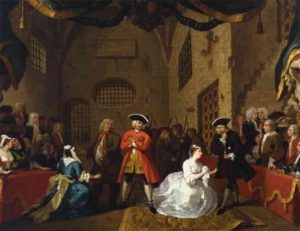
As well as lightheartedly mocking his friend Handel, Gay’s The Beggar’s Opera was fun, familiar and accessible to the audiences of his time. He used Scottish folk melodies plus two French tunes to serve his hilariously pointed and irreverent texts. He tightly controlled the dialogue and plot so that there are surprises in each of the forty-five, fast-paced scenes and 69 short songs. The opera created a rush by the public for keepsakes and mementos, ranging from images of Polly on fans and clothing, playing cards and fire-screens, broadsides featuring all the characters, and the rapidly published musical score of the opera.
The play is sometimes seen as a call for libertarian values in response to the growing power of the conservative Whig party. It may also have been influenced by the then-popular ideology of Locke that men should be allowed their natural liberties – democratic strains of thought of which The Beggar’s Opera was a part.
The character of Macheath has been considered by critics as both a hero and an anti-hero. Harold Gene Moss, arguing that Macheath is a noble character, has written, “[one] whose drives are toward love and the vital passions, Macheath becomes an almost Christ-like victim of the decadence surrounding him.” Contrarily, he is seen as modernly ambiguous, and even is thought now to have been modeled on the gentleman highwayman, Claude Duval.
